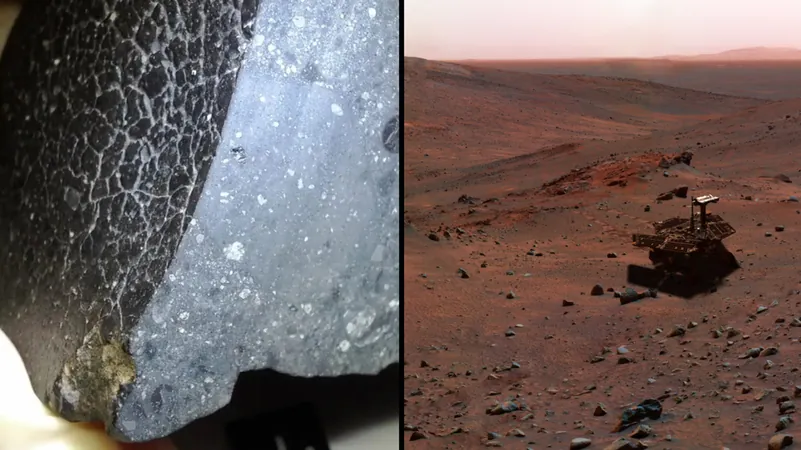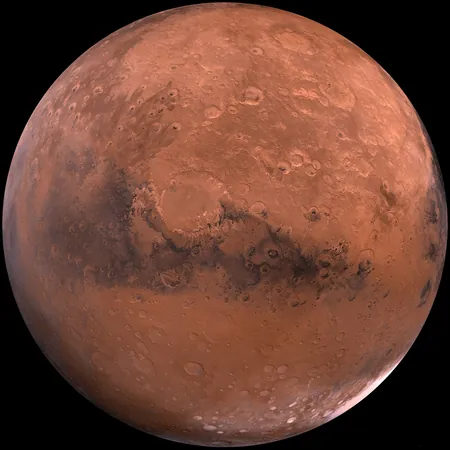
Groundbreaking Mars Meteorite Revelation: What 'Black Beauty' Reveals About the Red Planet's Ancient Water History!
2024-12-04
Author: William
Groundbreaking Mars Meteorite Revelation
Scientists have made a groundbreaking discovery about the enigmatic history of Mars by studying a meteorite believed to be around 4.5 billion years old. This incredible chunk of space rock, affectionately dubbed 'Black Beauty' due to its smooth, dark exterior, found its way to Earth after being ejected from Mars during a massive impact event.
Discovery and Composition
First unearthed in Morocco back in 2011 by local nomads and later purchased by a meteorite dealer, this fascinating specimen - officially classified as Northwest Africa 7034 - has been a focal point for research ever since. Over the past 13 years, a dedicated team of scientists has been analyzing its unique composition, and their findings are nothing short of revolutionary.
Scientific Insights
Lead researcher Aaron Cavosie from Curtin University in Australia described the meteorite as "a wonderful buffet of Martian history," highlighting its combination of both ancient and relatively younger rocks. Among the most striking components of Black Beauty are the tiny fragments that originated from deep beneath Mars' surface, crystallized from magma, which provide a glimpse into the planet's formative years.
Chemical Anomalies
Through meticulous analysis, Cavosie and his team discovered layers of iron, aluminum, and sodium that were structured in a thin, uniform manner. This anomaly raises compelling questions about the prehistoric environment of Mars, suggesting that the planet was once much wetter than we currently understand.
Implications of the Findings
"We wondered, where else do you find elements like this?" Cavosie explained, emphasizing that the unique zircon formations are indicative of hydrothermal systems active during periods of volcanism. “The presence of hot water would have facilitated the incorporation of these elements into the crystal structures, layer by layer,” he added.
New Understanding of Martian Water History
The implications of these findings are monumental. Eva Scheller, a collaborator from Stanford University, suggested that this evidence points to a time when water vapor was abundant in the Martian atmosphere, potentially laying the groundwork for rivers and lakes. “At such an ancient age of 4.5 billion years, we find ourselves at the very moment Mars was forming,” Scheller explained. “This marks evidence of some of the earliest water-related activities on the planet.”
Search for Past Life
This discovery not only reshapes our understanding of Mars' geological history but also fuels the ongoing search for signs of past life on the Red Planet. As scientists continue to unlock the secrets of 'Black Beauty,' the tantalizing possibility of once-habitable conditions on Mars becomes increasingly plausible, leaving us to wonder: could this barren landscape once brimming with water have nurtured life forms millions of years ago?
Conclusion
As we delve deeper into Mars' past, who knows what additional surprises await? Stay tuned as the story unfolds!









 Brasil (PT)
Brasil (PT)
 Canada (EN)
Canada (EN)
 Chile (ES)
Chile (ES)
 España (ES)
España (ES)
 France (FR)
France (FR)
 Hong Kong (EN)
Hong Kong (EN)
 Italia (IT)
Italia (IT)
 日本 (JA)
日本 (JA)
 Magyarország (HU)
Magyarország (HU)
 Norge (NO)
Norge (NO)
 Polska (PL)
Polska (PL)
 Schweiz (DE)
Schweiz (DE)
 Singapore (EN)
Singapore (EN)
 Sverige (SV)
Sverige (SV)
 Suomi (FI)
Suomi (FI)
 Türkiye (TR)
Türkiye (TR)